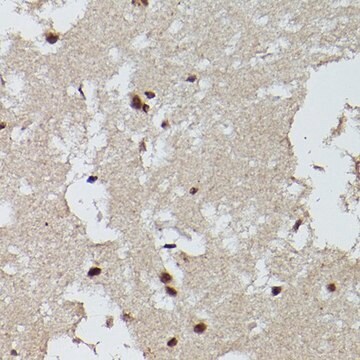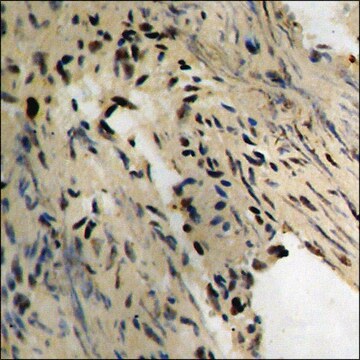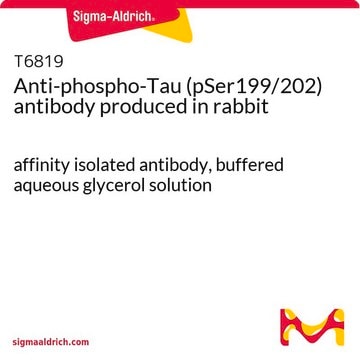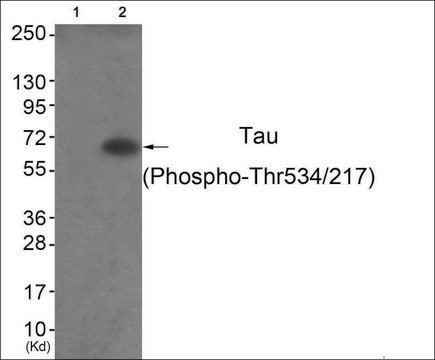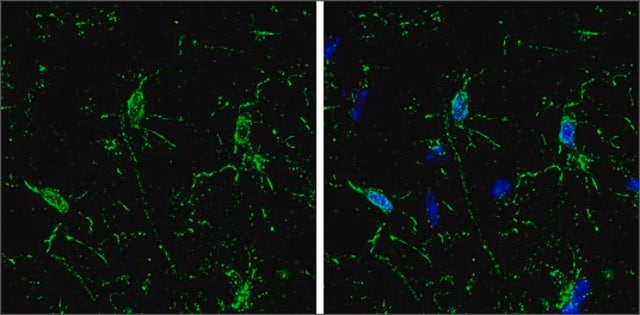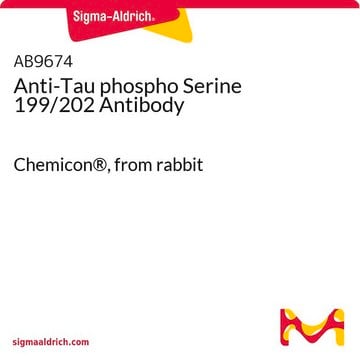おすすめの製品
由来生物
rabbit
品質水準
抗体製品の状態
affinity purified immunoglobulin
抗体製品タイプ
primary antibodies
クローン
polyclonal
精製方法
affinity chromatography
化学種の反応性
human
メーカー/製品名
Chemicon®
テクニック
western blot: suitable
NCBIアクセッション番号
UniProtアクセッション番号
輸送温度
dry ice
ターゲットの翻訳後修飾
phosphorylation (pThr231)
遺伝子情報
human ... MAPT(4137)
詳細
タウは、主に軸索に見られる神経細胞微小管関連タンパク質で、チューブリン重合を促進し、微小管を安定化させるように作用します。過リン酸化型のタウは、対らせん状フィラメント(PHF)の主要成分であり、アルツハイマー病(AD)脳の神経原線維病変の構成要素です。過リン酸化タウは、他のさまざまな中枢神経系障害における神経原線維病変にも見られます。過リン酸化は、タウの微小管結合機能を損ない、結果としてAD脳の微小管を不安定化させ、最終的にはその影響を受けたニューロンの変性を引き起こします。数多くのセリン/トレオニンキナーゼ、例えばGSK-3β、プロテインキナーゼA(PKA)、サイクリン依存性キナーゼ5(cdk5)、およびカゼインキナーゼII(CK2)などが、タウをリン酸化します。Threonine 231はGSK-3ベータ,cdk5、およびcdk1によってリン酸化され、ADのプリタングル過程に関与することが示されています。
特異性
タウホスホトレオニン231。 この抗体は、 GSK-3ベータで45分間処理したリコンビナントヒトタウ検体中のTau pThreonine 231を認識します。抗体の反応性はpThreonine 231ペプチドによって遮断されますが、非ホスホペプチドや一般的なphosphoThreonine含有ペプチドでは遮断されません。
免疫原
ヒトタウのホスホトレオニン231周囲のアミノ酸の合成ペプチド。
アプリケーション
Anti-Tau phospho Threonine 231 Antibodyは、タウホスホトレオニン231の濃度を検出します。WBでの使用が&文献として公表&され、検証されています。
ウェスタンブロッティング:1:1,000。推奨されるブロッキングバッファーは5%BSA-TBST。室温で1時間。推奨される抗体希釈バッファーは1% BSA-TBST。推奨される抗体インキュベーション時間は室温で2時間。
最適な希釈濃度は、ご自身で決定してください。
最適な希釈濃度は、ご自身で決定してください。
研究のカテゴリ
神経科学
神経科学
研究のサブカテゴリ
神経変性疾患
神経変性疾患
物理的形状
アフィニティー精製免疫グロブリン。 Dulbecco′s PBS(Mg2+とCa2+を含まない)中の液体であり、pH 7.3、1.0 mg/mL BSA と0.05%アジ化ナトリウムを含む50%グリセロール。
保管および安定性
-20°Cで受領日から最大6カ月間未希釈のまま保存できます。凍結融解を繰り返さないでください。 自動霜取り機能付き冷凍庫には保存ないでください。
法的情報
CHEMICON is a registered trademark of Merck KGaA, Darmstadt, Germany
免責事項
メルクのカタログまたは製品に添付されたメルクのその他の文書に記載されていない場合、メルクの製品は研究用途のみを目的としているため、他のいかなる目的にも使用することはできません。このような目的としては、未承認の商業用途、in vitroの診断用途、ex vivoあるいはin vivoの治療用途、またはヒトあるいは動物へのあらゆる種類の消費あるいは適用などがありますが、これらに限定されません。
Not finding the right product?
Try our 製品選択ツール.
保管分類コード
10 - Combustible liquids
WGK
WGK 2
適用法令
試験研究用途を考慮した関連法令を主に挙げております。化学物質以外については、一部の情報のみ提供しています。 製品を安全かつ合法的に使用することは、使用者の義務です。最新情報により修正される場合があります。WEBの反映には時間を要することがあるため、適宜SDSをご参照ください。
Jan Code
AB9668:
試験成績書(COA)
製品のロット番号・バッチ番号を入力して、試験成績書(COA) を検索できます。ロット番号・バッチ番号は、製品ラベルに「Lot」または「Batch」に続いて記載されています。
Alexandra Marquez et al.
Neurobiology of disease, 151, 105273-105273 (2021-01-23)
Pathological hyperphosphorylated tau is a key feature of Alzheimer's disease (AD) and Frontotemporal dementia (FTD). Using transgenic mice overexpressing human non-mutated tau (htau mice), we assessed the contribution of tau to peripheral and central neurodegeneration. Indices of peripheral small and
Abhay P Sagare et al.
Nature communications, 4, 2932-2932 (2013-12-18)
Pericytes are cells in the blood-brain barrier that degenerate in Alzheimer's disease (AD), a neurological disorder associated with neurovascular dysfunction, abnormal elevation of amyloid β-peptide (Aβ), tau pathology and neuronal loss. Whether pericyte degeneration can influence AD-like neurodegeneration and contribute
Matthew R King et al.
Journal of neuroscience research, 98(11), 2357-2369 (2020-08-02)
Epidemiological studies have pointed at diabetes as a risk factor for Alzheimer's disease (AD) and this has been supported by several studies in animal models of both type 1 and type 2 diabetes. However, side-by-side comparison of the two types
Andrew C Wang et al.
Proceedings of the National Academy of Sciences of the United States of America, 113(52), 15120-15125 (2016-12-14)
O-GlcNAc glycosylation (or O-GlcNAcylation) is a dynamic, inducible posttranslational modification found on proteins associated with neurodegenerative diseases such as α-synuclein, amyloid precursor protein, and tau. Deletion of the O-GlcNAc transferase (ogt) gene responsible for the modification causes early postnatal lethality
Ashleigh Duthie et al.
Frontiers in molecular neuroscience, 12, 163-163 (2019-07-19)
Lithium has been used for decades to treat Bipolar Disorder. Some of its therapeutic benefits may be through inhibition of Glycogen Synthase Kinase (GSK)-3. Enhanced GSK3 activity associates with development of Alzheimer's disease (AD), therefore lithium is a currently used
プロトコル
A stem cell culture protocol to generate 3D NSC models of Alzheimer’s disease using ReNcell human neural stem cell lines.
ライフサイエンス、有機合成、材料科学、クロマトグラフィー、分析など、あらゆる分野の研究に経験のあるメンバーがおります。.
製品に関するお問い合わせはこちら(テクニカルサービス)